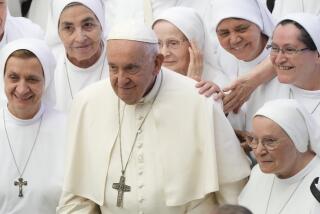Pope’s Teachings Urge a Faith in Reason
- Share via
VATICAN CITY — Decrying a skeptical postmodern society that relegates religion and ethics to “the realm of mere fantasy,” Pope John Paul II called Thursday for a marriage of faith and rational thought in the search for truth about the human condition.
In an encyclical titled “Faith and Reason,” the Roman Catholic leader stressed that the two are not incompatible. But he said it is his church’s duty to reject philosophies at odds with “certitudes of faith.”
John Paul, who taught moral theology and philosophy in his native Poland, addressed the encyclical letter to Catholic bishops on the eve of his 20th anniversary as pope. It was the 13th major teaching of his papacy, one of the most prolific in the church’s 2,000-year history.
Aimed ultimately at philosophers and theologians, the 154-page document lacks the scolding prescriptions of his earlier papal teachings, and it raises more questions than it pretends to answer.
But “Faith and Reason” underscores a theme running through all the pope’s teaching--that humankind can, and must, agree on certain universal truths.
The encyclical laments the rise of nihilism, historicism, agnosticism, relativism and other beliefs “that tend to devalue even the truths that had been judged certain.”
This, he wrote, has led philosophy “to lose its way in the shifting sands of widespread skepticism,” while ordinary people, especially the young, “stumble through life on the very edge of the abyss without knowing where they are going.”
John Paul called on philosophers to “look more deeply at man” and support “the human being’s unceasing search for truth and meaning.”
Since ancient times, in different cultures, he noted, humankind has always asked such fundamental questions as “Who am I? Where have I come from, and where am I going? Why is there evil? What is there after this life?”
“The human being is by nature a philosopher,” he wrote.
The philosopher’s quest for answers, the pope insisted, must be unlimited and “consonant with the word of God.” It must not contradict basic truths concerning human freedom and ethical behavior. One of the encyclical’s key passages said:
“The word of God reveals the final destiny of men and women and provides a unifying explanation of all they do in the world. This is why it invites philosophy to engage in the search for the natural foundation of this meaning, which corresponds to the religious impulse innate in every person.
“A philosophy denying the possibility of an ultimate and overarching meaning would be not only ill-adapted to its task, but false.”
John Paul has reached out during his papacy to find common ground with other religions, and this encyclical was written in that spirit. He called for “clear and honest collaboration” among thinkers of all faiths and even those who reject God but believe in universal truth.
Philosophical debate across religious lines, he wrote, could help confront “the most pressing issues facing humanity--ecology, peace and the coexistence of different races and cultures.”
Some theologians saw the document as a historical paradox.
American theologian George Weigel said: “At the end of the 20th century--a century that began with virtually all enlightened opinion thinking that the Catholic Church was the enemy of rationality and progress--who is the great defender of the capacity of human reason to grasp the truth? Who else but the bishop of Rome?”
“People sometimes think religion is an isolated element of human knowledge, and what really makes the world run is science,” said Agustin di Noia, theologian to the U.S. National Episcopal Conference.
“It is a message of hope and optimism,” said Msgr. Jozef Zycinski, the archbishop of Lublin, Poland. “It is particularly precious in today’s world of disappointments, desperation and moral void.”
More to Read
Sign up for Essential California
The most important California stories and recommendations in your inbox every morning.
You may occasionally receive promotional content from the Los Angeles Times.













